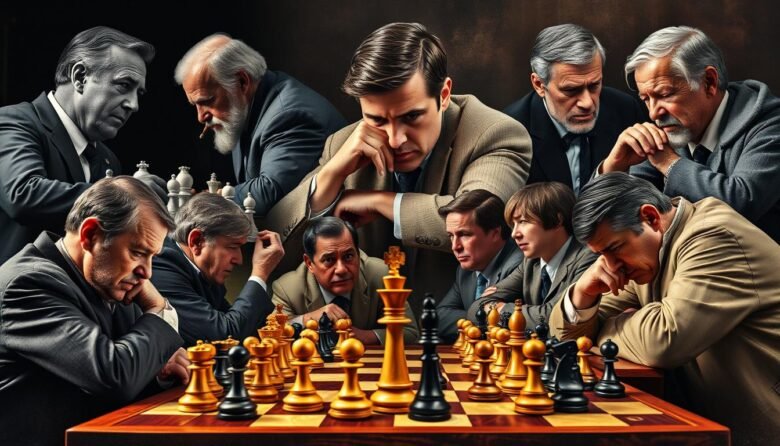The world of chess is filled with the legacies of famous players. They have greatly shaped the game. Renowned champions have shown unmatched skill and strategy, making chess a respected sport of the mind.
These legendary masters have opened doors for future players. They left behind techniques and strategies that inspire many. Knowing their contributions is key, as they’ve also changed the game’s cultural context.
Introduction to Chess Legends
Chess is a highly respected strategic board game with a long history. It has roots in many cultures, each adding to its growth. The game requires deep thinking, planning, and tactics, making it exciting for players everywhere.
Every game is a battle of wits, with complex rules and endless possibilities. This keeps players hooked and eager for more.
Overview of Chess as a Game
Chess is all about strategy and creativity. Players move different pieces, each with its own strengths, to outsmart their foes. It’s more than just fun; it’s a blend of art and science.
Many see learning chess as learning a new language. It lets players share their ideas and strategies in a unique way.
Importance of Influential Players
Chess legends have greatly shaped the game. They’ve shared their techniques and views, influencing chess strategies. Their impact inspires both beginners and pros, pushing the game forward.
Each legend adds to the chess world, making it vibrant and ever-changing. Their contributions keep the game fresh and exciting.
Garry Kasparov: The Icon of Chess
Garry Kasparov is a giant in chess, inspiring many. His career shows his wins and the game’s growth. He has left a lasting mark on chess.
Early Life and Chess Beginnings
Garry Kasparov was born on April 13, 1963, in Baku, Azerbaijan. He showed great intelligence from a young age. At six, he started playing chess, learning from his father.
By 13, he won the Soviet Junior Championships. This showed his talent and a bright future in chess.
Remarkable Achievements
Kasparov’s career was filled with achievements. He became the youngest World Chess Champion in 1985. He kept this title for 15 years.
He won many tournaments, becoming a chess legend. His rivalries with other grandmasters were thrilling. They drew fans to the game.
Contributions to Chess Theory
Kasparov also made big contributions to chess theory. He introduced new opening and endgame strategies. His work changed how chess is played today.
His writings gave insights to new players. His impact on chess theory will keep inspiring future players. He is a key part of chess education.
Bobby Fischer: The Game Changer
Bobby Fischer is a key figure in chess, changing the game forever. His unique strategies and determination led him to the top. He became famous for his relentless pursuit of excellence and groundbreaking achievements.
Rise to Prominence
Fischer showed incredible talent in chess from a young age. His dedication and unique methods won fans and fellow players. He was known for his thorough preparation and psychological tactics, beating many famous players.
This drive made him a leader in the chess world. It also changed what it means to compete at the highest level.
The 1972 World Championship
The 1972 World Championship in Reykjavik, Iceland, was Fischer’s highlight. He faced Boris Spassky, the reigning champion. This match was huge, seen as a battle between the US and the Soviet Union.
Fischer’s win not only made him a chess legend. It also brought new fans to the game in America.
Impact on American Chess
Fischer’s success had a huge impact on American chess. His victories inspired many to play, boosting interest nationwide. He helped start chess programs in schools and public places.
His legacy continues to inspire new players. It encourages them to explore chess strategy.
Anatoly Karpov: Master of Strategy
Anatoly Karpov is a chess legend known for his deep understanding of strategy. He started playing chess early and went on to achieve great things. His skill in combining tactical moves with deep strategic thinking made him stand out.
Background and Career Highlights
Karpov was born in 1951 in Zlatoust, Russia. He showed incredible talent from a young age. He became World Chess Champion in 1975 and was a dominant force in the 1970s and 1980s.
He won many tournaments and defended his titles many times. His style focused on solid piece placement and subtle moves.
Rivalry with Kasparov
The rivalry between Karpov and Garry Kasparov was a key moment in chess history. Their games were epic battles of two different chess philosophies. Karpov’s strategic skill faced off against Kasparov’s aggressive style, thrilling fans everywhere.
Innovations in Endgame Theory
Karpov greatly improved endgame theory, a critical part of chess. He focused on practical endgame strategies, helping future players. His detailed analysis of endgames has shaped how we understand chess strategy today.
Judith Polgar: Breaking Gender Barriers
Judith Polgar is a trailblazer in chess, breaking down gender barriers. She showed that talent has no gender. Her skills and strategies paved the way for future female players. She challenged the norm and became a top competitor.
Early Training and Success
Judith Polgar showed incredible talent in chess from a young age. Her father’s early training set her on a path to greatness. She quickly rose through the ranks, becoming the youngest in World Chess Federation events.
Her early success challenged what people thought about women in chess.
Contributions to Women in Chess
Polgar’s impact on women in chess goes beyond her achievements. She inspired many by fighting for female participation. Competing against top male players, she raised awareness and encouraged others to follow their dreams.
Legacy in Modern Chess Tactics
Judith Polgar’s legacy in chess tactics is profound. Her innovative strategies and bold play have influenced many. She changed the game for women and left a mark on chess itself.
Her unique approach to openings and endgames continues to inspire. Her impact will be felt for generations to come.
Magnus Carlsen: The Modern Era Champion
Magnus Carlsen is a key figure in chess, known for his journey from child prodigy to World Champion. His rise to the top shows his talent, dedication, and strategic thinking. These qualities make him one of the best in the game.
Path to World Champion
Carlsen showed a natural talent for chess from a young age. By 13, he was already a Grandmaster. His skill in analyzing complex positions and predicting moves ahead made him stand out.
In 2013, he won the World Chess Championship title. This was a historic moment in chess history.
Statistics and Dominance
Throughout his career, Magnus Carlsen has shown impressive dominance. He holds the record for the highest chess rating ever, with a peak of 2882. His consistency has kept him at the top of the world rankings for years.
Influence on Popularizing Chess
Magnus Carlsen has also made chess more popular today. He has used media and platforms to make the game accessible to more people. His engaging personality and strategic insights have sparked interest in chess among the young.
Viswanathan Anand: India’s Chess Ambassador
Viswanathan Anand is a key figure in chess, especially for India. He became a World Champion, showing his amazing skills. His journey helped raise India’s status in chess worldwide.
Anand’s hard work and determination make him a symbol of excellence. He inspires many with his dedication to the sport.
Journey to World Championship
Anand’s chess career started early, with intense training and many competitions. He was the first Indian World Chess Champion in 2000. He won the title many times after that.
His unique style and strategic thinking brought a new era to chess. He inspired players in India and around the world.
Contributions to Global Chess
Anand has made big contributions to chess globally, not just through titles. He worked on promoting chess through international projects, workshops, and exhibitions. His efforts made chess more popular and introduced new ways to train players.
Promoting Chess in India
Anand is dedicated to promoting chess in India. He supports local tournaments and mentors young players. His work has sparked a growing interest in chess.
Now, there are more chess clubs and training centers in India. Anand’s influence inspires the next generation of chess players.
Deep Blue: The AI Revolution in Chess
Deep Blue was a game-changer in chess, showing how AI could challenge humans. It was created to see if computers could think deeply and strategically, key skills in chess. Deep Blue used advanced algorithms and lots of computing power to quickly check many positions.
Background and Development
IBM developed Deep Blue, using cutting-edge tech to boost its skills. It was programmed to handle huge amounts of chess data and learn from past games. This made Deep Blue a formidable opponent for top grandmasters, leading to historic battles between humans and machines.
Historic Matches Against Humans
The biggest showdowns were between Deep Blue and Garry Kasparov in the late 1990s. These matches drew global attention, sparking interest in AI and chess. In 1996, Kasparov won the first match, but Deep Blue stunned him in the rematch in 1997. This victory marked a turning point, seen as a key moment in chess and tech history.
Implications for Chess Strategy
The rise of AI in chess made players rethink their strategies. Deep Blue’s quick analysis forced players to change their tactics, often using computer advice. This shift has led to new ways of preparing for games and understanding chess, sparking fresh strategies and innovations.
Online Chess and the New Generation
Chess has changed a lot with online platforms. Now, players from everywhere can compete, learn, and connect. This shift has brought new life to the game, attracting a fresh wave of players.
Rise of Online Platforms
Websites like Chess.com and Lichess are key to the chess world today. They let players face off against others globally and offer tools for learning. This has sparked a surge in talent and excitement among young players.
Prominent Online Players
Stars like Hikaru Nakamura and Alireza Firouzja have made a big splash online. Their unique playing styles and personalities draw in fans. By streaming their games on Twitch, they bridge the gap between chess and entertainment.
Impact on the Chess Community
Online chess has brought more people into the game. It’s made chess more welcoming, attracting those who were once hesitant. Tournaments and leagues online celebrate diversity, welcoming players of all levels. Chess’s move to the digital world shows its enduring appeal and the community’s passion.
Conclusion: The Legacy of Famous Chess Players
The legacy of famous chess players goes beyond their wins. It has shaped the game’s growth and will keep influencing future players. Garry Kasparov and Bobby Fischer, for example, not only innovated but also brought chess to the public eye. They inspired many to play, leaving a lasting mark on the game.
Lasting Influence on Future Generations
Every new generation of chess players builds on what came before. They use the strategies and ideas of their predecessors to innovate. This legacy also motivates young players to explore the game’s depths. They learn from the greats, keeping the spirit of competition alive.
The Evolving Nature of Chess
Chess is changing, thanks to new technologies and platforms. It’s now more accessible to everyone. The mix of old and new ideas makes the game exciting for the future. This blend ensures that chess’s rich history will always shape its path.



